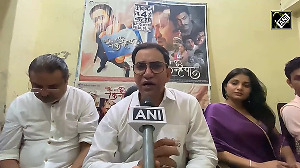A committee headed by Sam Pitroda, advisor to the Prime Minister, has suggested that state-run telecom major Bharat Sanchar Nigam Ltd should retire or transfer about 100,000 of its employees through measures such as a voluntary retirement scheme. This is a third of BSNL's total employee strength, of 300,000 across the country.
To improve organisational performance and employee productivity substantially, BSNL should induct young talent in all spaces -- technology, marketing, customer services and sales, the committee said in its report.
BSNL should also start a performance-driven culture and complete the absorption of staff from the Indian Telecommunication Service without delay. A restructuring of BSNL is already underway, under which four business units would be created for fixed access, mobility, enterprise and new businesses.
The committee also suggested creation of a separate subsidiary to hold a bank of underdeveloped land and other real estate assets, estimated to be about 2.5 million sq metres, and unutilised staff quarters. It should monetise the value of this subsidiary by collaborating with an experienced real estate company.
The committee, which also had HDFC Chairman Deepak Parekh and Union telecom secretary P J Thomas as its members, was set up to review the functioning of BSNL. For the first time, BSNL is expected to post a loss, due to increased competition and declining market share. Further, procedural delays on purchase of equipment and dependence on the government for decision making also hamper growth.
BSNL's 93-million lines GSM tender has been on hold for a long while due to various controversies. The company faces huge capacity crunch in many places and has been constantly losing subscribers and market share.
The committee also recommended scrapping of the 93-million line tender. It said BSNL should follow a lease arrangement for telecom equipment, rather than purchase. Private telecom companies follow such a model for expansion. With this model, BSNL would reduce its capital expenditure, besides reducing its problem of having shortage of young trained engineers in the latest technologies, the panel felt.











